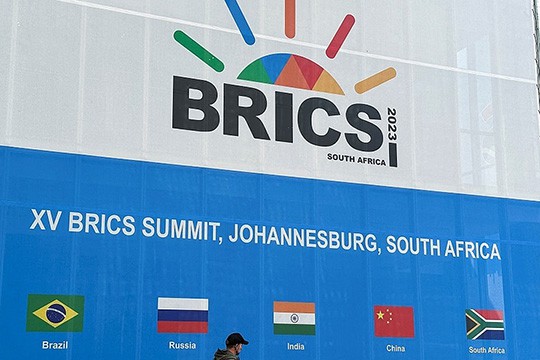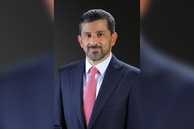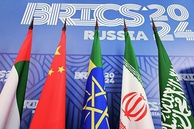En route to the African continent, those of us on the special flight of Russian Foreign Minister Sergey Lavrov made forecasts about what would happen at the summit in Johannesburg, how BRICS expansion would unfold, which countries would join the Big Five, and how many. After the IL-96 aircraft of the Russia flight group took off, the minister, as is his custom, went into the main cabin to meet with journalists. He was in excellent form, in a good mood, and friendly and witty as always. He wished us successful work. We wished him the same. We flew on, anticipating a large-scale, world-class event. And then there were three days of summit meetings – three days that changed the world forever. Expectations were not simply met, but exceeded the wildest forecasts. The XV BRICS summit became the most representative in the entire history of the association. Delegations from nearly 60 countries took part in the forum. Its decisions, without any exaggeration, can be called historic.
BRICS now consists of 11 states that are full members of the association. In Johannesburg, an invitation to join the Big Five was extended to Argentina, Egypt, Iran, Ethiopia, the UAE, and Saudi Arabia. The numbers are as follows: 45% of the planet’s population (3.6 billion people), 32% of the entire earth’s landmass (48.4 million square kilometers, twice as much as the G7), 37% of the world’s GDP, and 45% of the world’s oil reserves. The foreign trade turnover of the BRICS countries, including the new members, amounted to $12.4 trillion in 2022, which is one-fifth of the volume of world trade (which amounts to $61.08 trillion, according to the World Bank).
It is also significant that, unlike the G7 states, the BRICS countries are demonstrating global demographic growth. Amid the predicted decline in industry in Europe and the US, the BRICS share in the world economy will also increase. According to forecasts, by 2050, BRICS countries will make the list of the top 10 most efficient economies in the world, and the balance of power in the international arena, as well as the entire architecture of global governance, will change radically and irrevocably.
The theme of the XV summit – “BRICS and Africa: Partnership for Mutually Accelerated Growth, Sustainable Development and Inclusive Multilateralism” – is relevant to all countries of the global majority. Therefore, it is not surprising that top officials not only from the countries of the African continent but also the countries of Asia and Latin America were present in Johannesburg. At the forum, Russia was represented by Foreign Minister Sergey Lavrov, who attended the summit in person. He was greeted with friendly warmth, as an honored and special guest. South Africa has fresh impressions from the Second Russia-Africa Summit, attended by South African President Cyril Ramaphosa, which recently concluded in St. Petersburg.
Ahead of the summit, the head of the Russian Foreign Ministry noted in an interview with our publication:
Increasingly, more countries from the Global South and East are beginning to realize and formulate their own national interests and pursue policies focused on their implementation in the spirit of international cooperation. These states are insisting more and more on establishing a fairer world order – through the reform of existing interaction formats or the creation of new ones to address specific security and development challenges. We support this trend based on a clear understanding that this is where the future lies.
BRICS is an example of such a new format – appealing, effective, and promising. It is a new unifying force, a space for fair dialogue among all participants in international activities, and a universal platform for cooperation rather than competition, where everyone can reach an agreement with everyone else. This is a practical response to the long- overdue need to move global governance in a fairer and smarter direction.
Closer and more diverse inter- action within BRICS is aimed at establishing and strengthening emergent models of effective and mutually beneficial cooper- ation that are not subject to the whims of the 21st-century neo-colonialists.
The BRICS summit took place amid a flurry of diplomatic activity. According to local observers, BRICS diplomatic activities have seriously undermined the US White House’s strategy toward many countries, including Russia. It is obvious that the administrative resources of the “world’s police officer” no longer operate as before. Previously, the West viewed BRICS merely as a negotiating platform with little influence on the international agenda. Now that there is a queue to join the bloc, it cannot be called ephemeral. The expansion of BRICS marks the moral victory of the global majority over the collective West.
Putin’s speech was met with great interest in Johannesburg. He took part in the summit via video link.
We are all united in our commitment to shaping a multipolar world order with genuine justice, based on international law and in keeping with the key principles set forth in the UN Charter, including sovereignty and respect for the right of every nation to follow its own development model. We oppose hegemonies of any kind and the exceptional status that some countries aspire to, as well as the new policy it entails – a policy of continued neo-colonialism.
Everyone in Johannesburg found these words from the Russian leader’s speech relatable.
The part of the president’s speech that addressed the need to strengthen cooperation within BRICS in the field of global innovation was also met with understanding. “We expect cooperation as part of the BRICS initiative to establish an international infrastructure network with a dedicated fund, which could be used to support and develop it,” the president emphasized. Vladimir Putin recalled that Russia will assume chairmanship of BRICS in 2024, and that the next summit will take place in October 2024, in Kazan. “We intend to hold about 200 events on political, economic, and social matters in over 10 Russian cities,” the Russian leader announced.
Such large-scale interest in BRICS and the rapid growth of the association’s influence on the global agenda is obviously not to the liking of Western countries. Even during the preparation stage of the summit, they tried in various ways to prevent it from taking place. Various diplomatic and information tools were used to sow discord among the BRICS countries, particularly on the Ukrainian issue: a meeting in Jeddah, a G7 meeting in Hiroshima, a so-called “summit” meeting in Copenhagen, as well as ongoing speculation regarding alleged differences in BRICS over the admission of new members to the organization.
Among these subversive attempts was a request from French President Emmanuel Macron for an invitation to Johannesburg. He never got one. Russian Foreign Ministry spokeswoman Maria Zakharova commented at the time that BRICS was created to increase the role of developing countries in a multipolar world and solve problems that are important to the entire world. “The participation of the president of France in the BRICS summit would not help meet those objectives,” the diplomat noted, emphasizing that Russia considers it inappropriate for representatives of countries that are in the “vanguard of a hostile policy toward our country” to participate in BRICS meetings.
Lavrov gave his assessment of the destructive policy of the so-called collective West during his final press conference. In response to a question from International Affairs about the likelihood of these states adopting a more common sense-based foreign policy course, the minister said:
As for when the West might turn toward common sense, I cannot make any judgment. The “officials” now leading Western governments in the vast majority of countries are showing unity in promoting the American agenda under Washington’s leadership – even, as we see in Europe, to the detriment of their own economies and citizens. This group of countries is completely driven by ideology. As President Putin once put it, they “imagine themselves to be inhabitants of heaven and are trying to act the part of the Lord God.”
Sometimes we come across such people; we have conversations with them on the sidelines, but no glimmer of common sense can be seen. “You must,” “you are obligated.” To whom are we obligated and for what? This is not a situation where you can expect to convey your viewpoint through dialogue and hope that your vis-à-vis will at least hear it.
We are always open to discussions, but we are not going to respond to boorish ultimatums, blackmail, and threats by calling for discussions. The Westerners themselves say that they must “get victory” over Russia on the battlefield and “inflict a strategic defeat.” This is what they have now instead of common sense. This means that we are going to work on this “field” – not on the diplomatic or international legal field but on the battlefield.
They understand this perfectly well but cannot utter it. They are not allowed to. They know why we are fighting there. Russian President Putin clearly stated this when speaking at the BRICS summit: for our security, for the interests of people who want to speak Russian, teach their children in Russian, and enjoy the fruits of Russian culture on lands that were home to their ancestors for centuries. This is something that should be clear to everyone.
Answering another question from our publication about whether the topic of democratizing the activities of the UN and reviving its central role in coordinating the interests of member states was discussed on the sidelines of the summit, the head of the Russian Foreign Ministry said:
We have been talking for a long time about the need for UN reform. Over the past 15 years, many innovations have been introduced, various commissions have been created on peacebuilding (this topic has been added to the agenda), on climate issues, on artificial intelligence, and on information technology. Much has been accomplished. This helps the organization adapt to global developments, including in science and technology.
The main issue is reform of the Security Council. It is this body that symbolizes the UN in the eyes of most people. It has unique powers, including the power to make decisions on matters of war and peace, as well as on coercive measures such as sanctions. When we talk about justice and democratization, we cannot accept the fact that six of the 15 members of the Security Council represent the “camp” of the US and are completely subordinate to its will.
In the documents we have adopted, there is a paragraph confirming the commitment of BRICS countries to UN Security Council reform in order to increase the representation of developing countries. India, Brazil, and South Africa are mentioned there as states whose active role in the UN we value and want to strengthen within the framework of the Security Council.
This was the first time that BRICS documents stated our support for UN Security Council reform through the expansion of developing countries’ representation in all categories of membership, including permanent membership.
We have once again clarified our position regarding the other two candidates for permanent seats. India and Brazil have been submitting official applications for a long time now, as have Germany and Japan, forming the so- called “Group of Four. In a situational sense, their interests coincide, but in a semantic sense, there can be no talk of Germany and Japan joining the Security Council on a permanent basis, thereby exacerbating injustice. More than a third of the current composition of the Security Council represents countries of the so-called “golden billion,” while the remaining 7 billion [of Earth’s inhabitants] are underrepresented. Neither Germany nor Japan would bring anything new to Security Council discussions. They are obedient executors of Washington’s will, as are almost all the Western countries. The rare calls for the European Union’s “strategic autonomy” are easily overshadowed by resounding cries of “maintain discipline” and “do not break ranks.”
Today’s decision, which was announced at the morning press conference (the decision to expand the association), will further strengthen our coordination. BRICS already holds regular events within the UN framework. For example, the UN General Assembly will take place in September. Every year, BRICS has a gathering there at the ministerial level.
We will not wait until January 1, 2024, but will begin establishing contacts in advance (as the future chairman of BRICS) with the new [BRICS] members. We will help them “get into action,” so that by the time of the Kazan summit, all 11 players (the size of a soccer team) are fully immersed in the issues on the agenda already announced by our chairmanship.
So, despite everything, BRICS is confidently moving forward, as clearly illustrated by the summit in Johannesburg. Member countries still have to formulate new regulations, establish new rules of interaction, and work on creating their own models in the financial sector as alternatives to Western ones (their own payment system, a new transfer system as an alternative to SWIFT, and their own insurance systems). But, as they say, where there’s a will, there’s a way. Moreover, the organization’s expansion opens up enormous opportunities for increasing mutual investments.
It is well known that any interaction is a two-way street, and in the case of BRICS, it is a multidirectional one. Of course, these multidirectional tracks can still have hidden dangers stemming from the destructive policies of the West. Closer and more diverse interaction within BRICS is aimed at establishing and strengthening emergent models of effective and mutually beneficial cooperation that are not subject to the whims of the 21st-century neocolonialists. The XV summit in Johannesburg took a giant step in this direction.
Johannesburg, 2023
read more in our Telegram-channel https://t.me/The_International_Affairs

 11:58 28.12.2023 •
11:58 28.12.2023 •



























